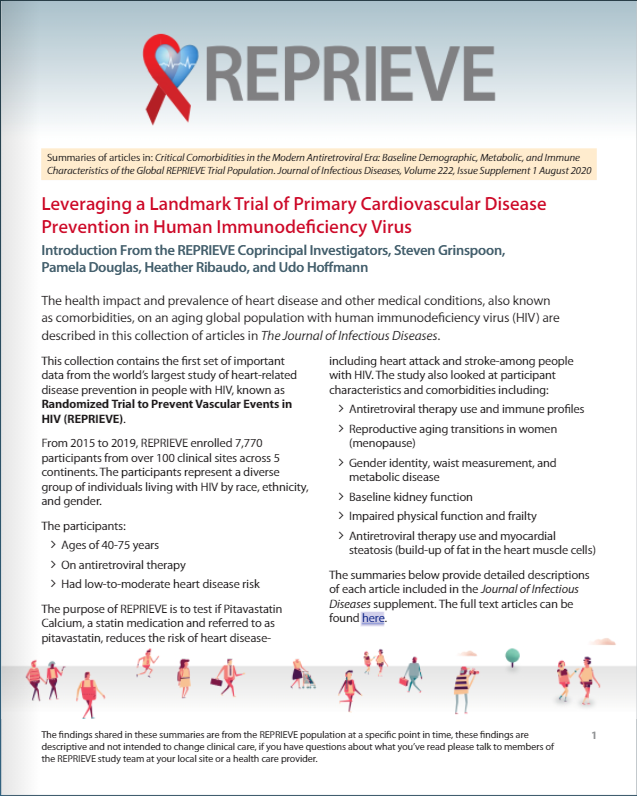
REPRIEVE Journal of Infectious Disease Supplement | 2020
Critical Comorbidities in the Modern Antiretroviral Era: Baseline Demographic, Metabolic, and Immune Characteristics of the Global REPRIEVE Trial Population
English Spanish Portuguese Thai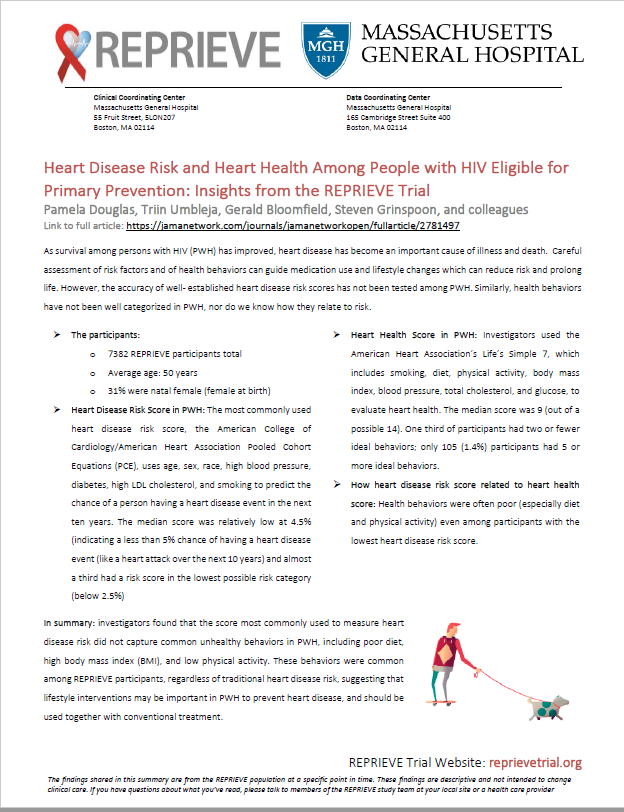
Heart Disease Risk and Heart Health Among People with HIV Eligible for Primary Prevention | 2021
Poor CV health by LS7 was common among REPRIEVE participants, regardless of PCE. This suggests a critical and independent role for lifestyle interventions in conjunction with conventional treatment to improve CV outcomes in PWH.
English Spanish French Haitian Creole
Assessment of Coronary Artery Disease with Computed Tomography Angiography and Inflammatory and Immune Activation Biomarkers Among Adults with HIV | 2021
These findings suggest that people with HIV at low to moderate risk of cardiovascular disease have a significant prevalence of coronary plaque associated with inflammation and immune activation markers.
English Spanish French Haitian Creole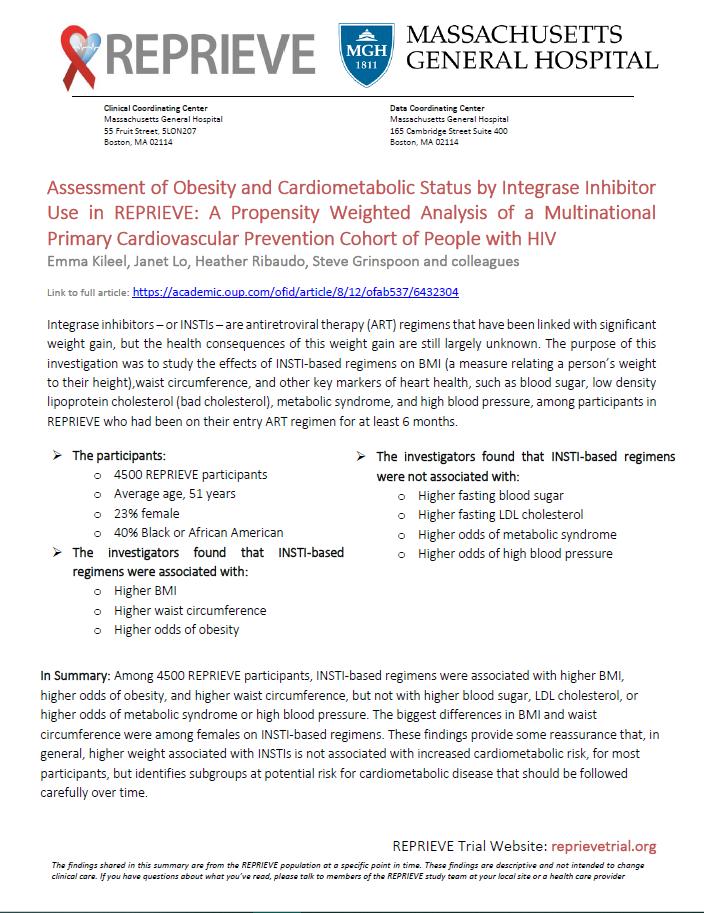
Assessment of Obesity and Cardiometabolic Status by Integrase Inhibitor Use in REPRIEVE | 2021
Differences in weight and waist circumference associated with INSTI use are (1) not uniform across people with human immunodeficiency virus, (2) greatest among women and nonwhites, and (3) concentrated at the upper tails of weight distribution. These data identify at-risk subgroups for whom long-term cardiovascular disease outcomes should be carefully assessed.
English Spanish French Haitian Creole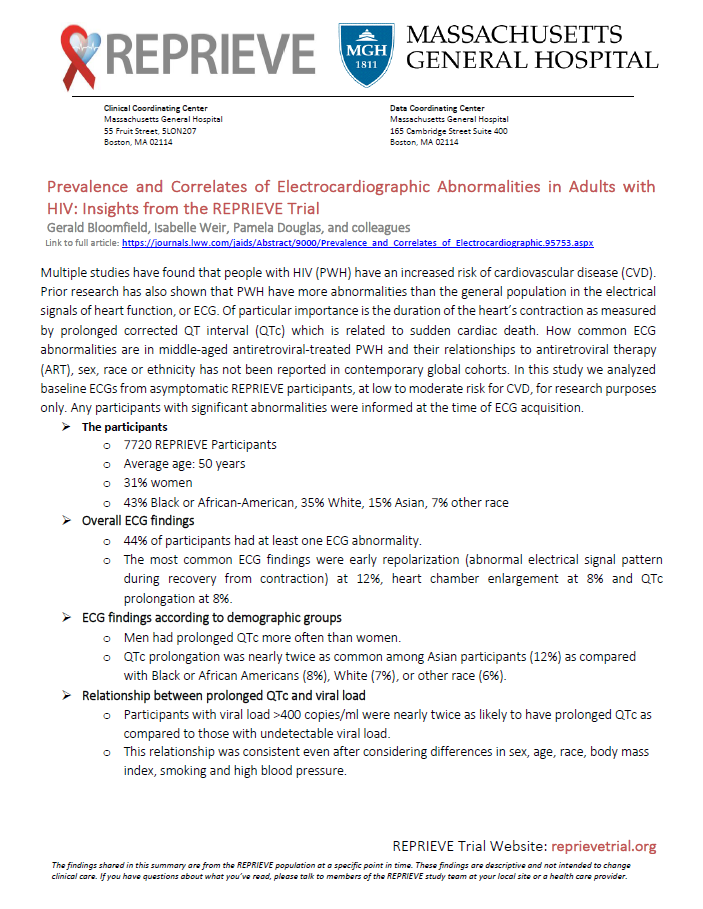
Prevalence and Correlates of Electrocardiographic Abnormalities in Adults With HIV: Insights From the Randomized Trial to Prevent Vascular Events in HIV | 2021
Prolonged QTc is common among male, Asian, and REPRIEVE participants with higher viral loads. These relationships warrant future investigation of linkages to ensuing CVD events among PWH.
English Spanish French Haitian Creole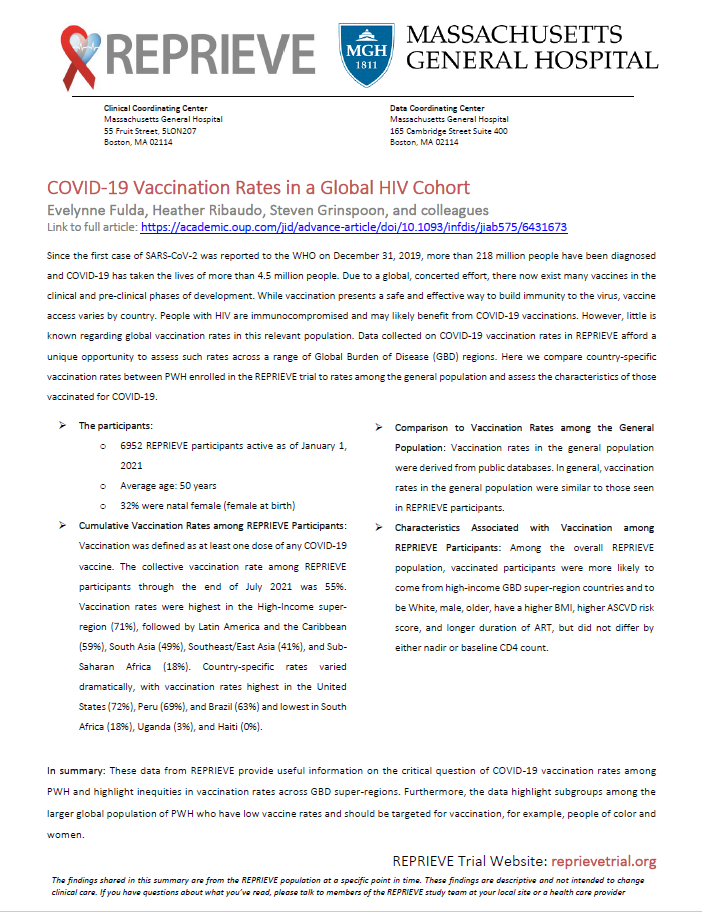
COVID-19 Vaccination Rates in a Global HIV Cohort | 2021
The global probability of COVID-19 vaccination through end of July 2021 was 55% among REPRIEVE participants with rates varying substantially by Global Burden of Disease (GBD) superregion. Among PWH, factors associated with COVID-19 vaccination included residence in high-income regions, age, white race, male sex, body mass index, and higher cardiovascular risk.
English Spanish French Haitian Creole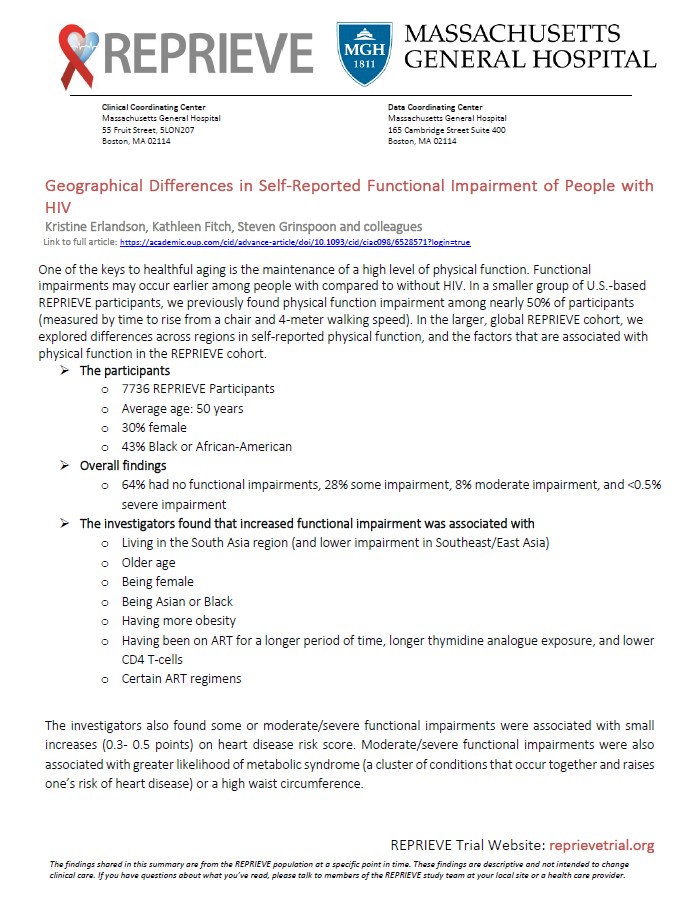
Geographical Differences in the Self-Reported Functional Impairment of People with HIV and Associations with Cardiometabolic Risk | 2022
Over 1/3 of middle-aged and older PWH in a global cohort across diverse GBD regions demonstrate functional impairments. The associations between DASI and cardiometabolic risk suggest that a measure of functional status may improve risk prediction; these longitudinal associations will be further investigated over REPRIEVE trial follow-up.
English Spanish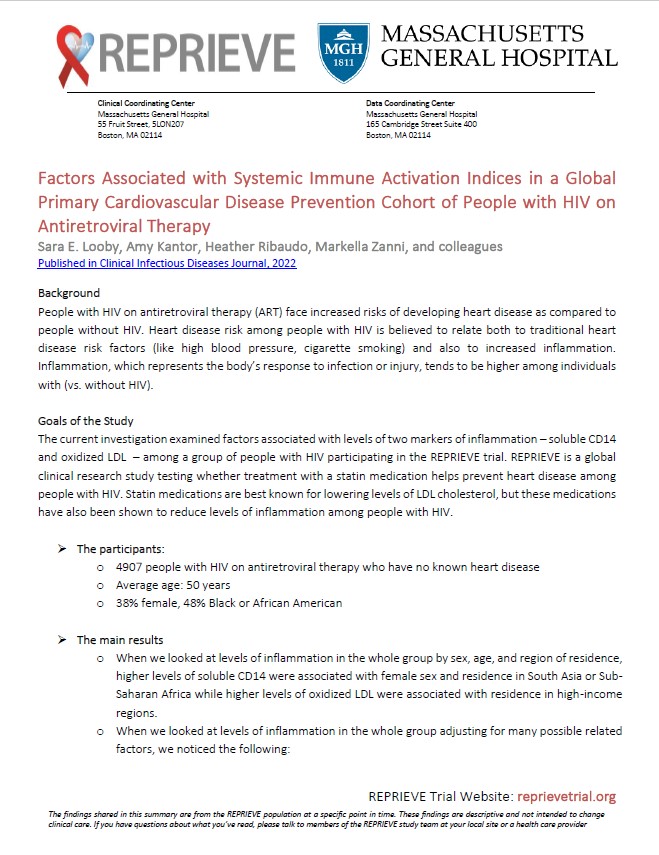
Factors Associated with Systemic Immune Activation Indices in a Global Primary Cardiovascular Disease Prevention Cohort of People with HIV on Antiretroviral Therapy
Factors associated with oxLDL and sCD14, two key indices of immune-mediated CVD risk, differ. Future studies will elucidate ways in which medications (e.g. statins) and behavioral modifications influence sCD14/oxLDL and the extent to which dampening of these markers mediates CVD-protective effects.
English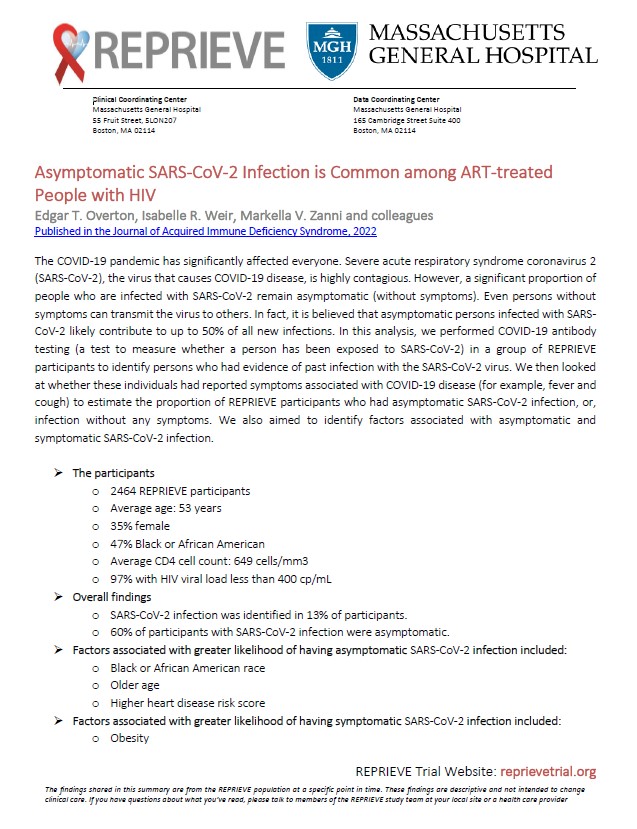
Asymptomatic SARS-CoV-2 Infection is Common among ART-treated People with HIV
Asymptomatic SARS-CoV-2 infection is common among ART-treated PWH globally. We determined that 60% of infections in PWH were asymptomatic. HIV clinicians must remain vigilant about COVID-19 testing among PWH to identify asymptomatic cases.
English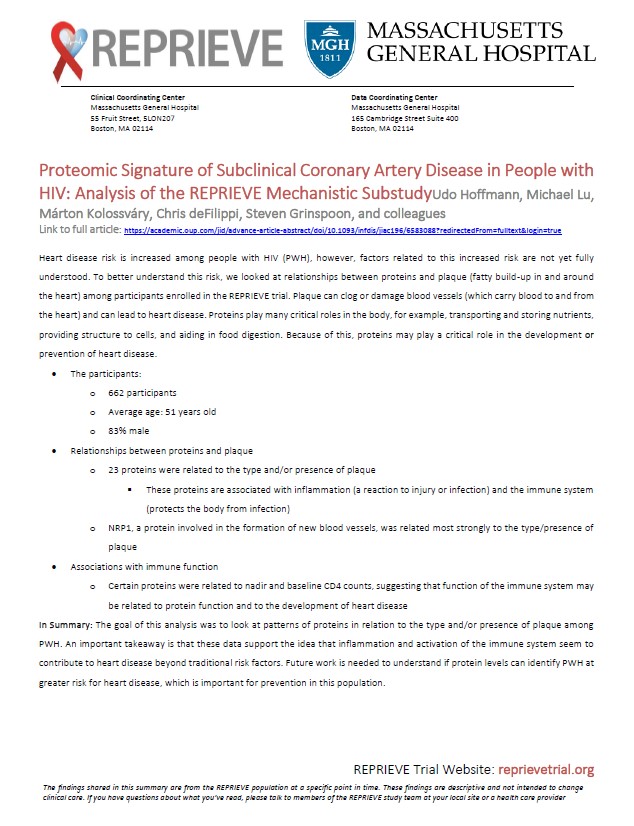
Proteomic Signature of Subclinical Coronary Artery Disease in People With HIV: Analysis of the REPRIEVE Mechanistic Substudy
Distinct immune and inflammatory pathways are differentially associated with subclinical CAD phenotypes among PWH. This comprehensive set of targets should be further investigated to reduce atherosclerosis and ASCVD in PWH.
English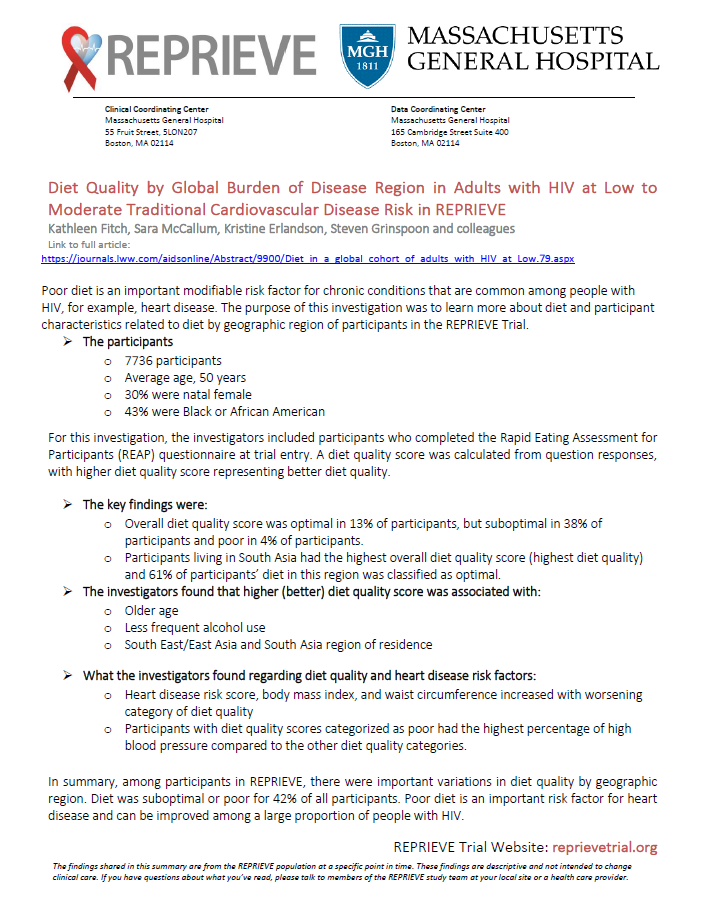
Diet Quality by Global Burden of Disease Region in Adults with HIV at Low to Moderate Traditional Cardiovascular Disease Risk in REPRIEVE
Poor diet is an important modifiable risk factor for chronic conditions that are common among people with HIV. This analysis found that there were important variations in diet quality by geographic region, and diet was suboptimal or poor for 42% of all participants. Poor diet is an important risk factor for heart disease and can be improved among a large proportion of people with HIV.
English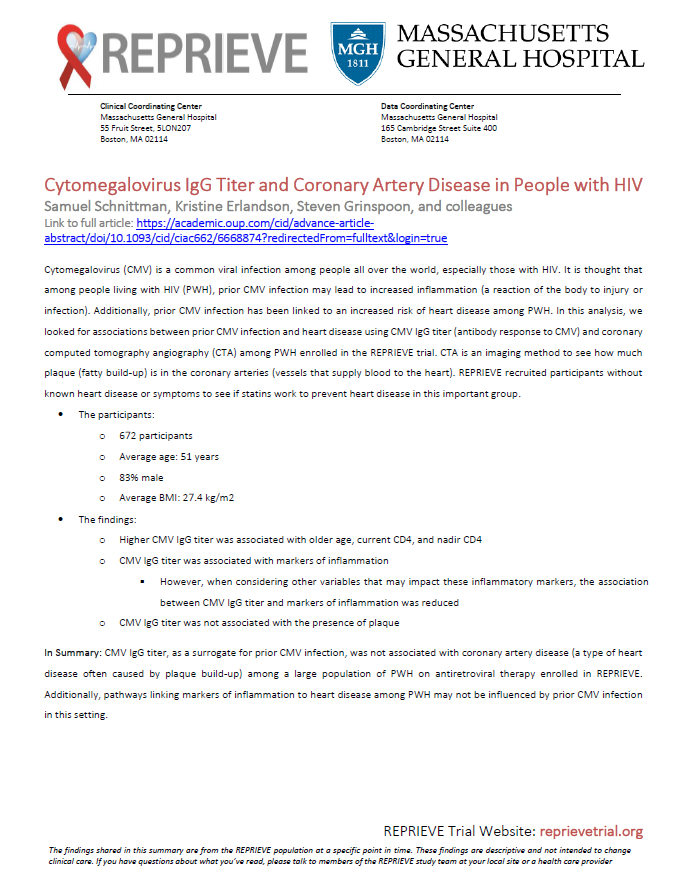
Cytomegalovirus Immunoglobulin G (IgG) Titer and Coronary Artery Disease in People With Human Immunodeficiency Virus (HIV)
Cytomegalovirus (CMV) is a common viral infection among people all over the world, especially those with HIV. It is thought that among people living with HIV (PWH), prior CMV infection may lead to increased inflammation. Additionally, prior CMV infection has been linked to an increased risk of heart disease among PWH. In this analysis, we looked for associations between prior CMV infection and heart disease using CMV IgG titer (antibody response to CMV) and coronary computed tomography angiography (CTA) among PWH enrolled in the REPRIEVE trial.
English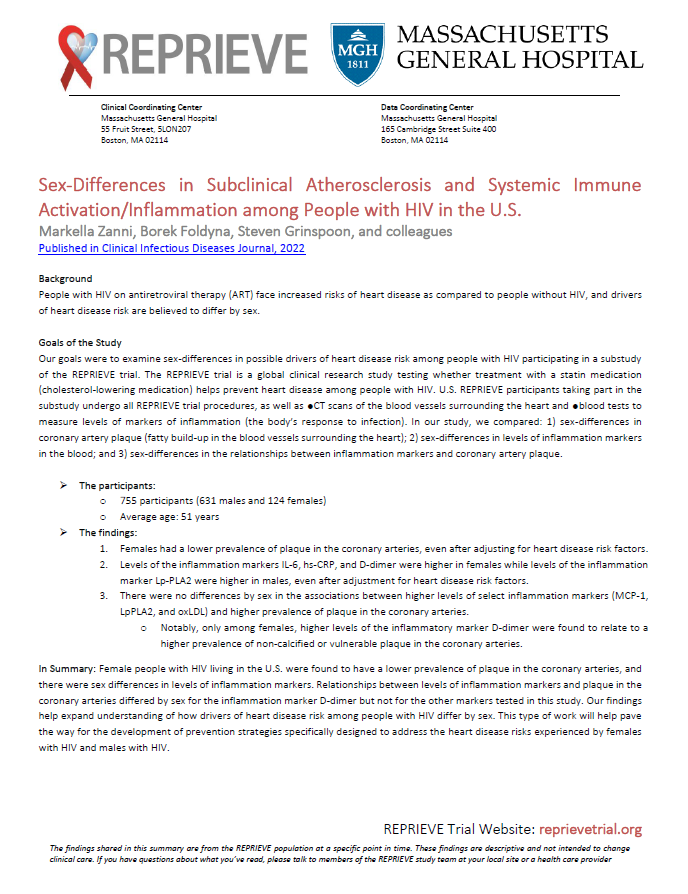
Sex-Differences in Subclinical Atherosclerosis and Systemic Immune Activation/Inflammation among People with HIV in the U.S.
People with HIV on antiretroviral therapy (ART) face increased risks of heart disease as compared to people without HIV, and drivers of heart disease risk are believed to differ by sex. The goals of this study were to examine sex-differences in possible drivers of heart disease risk among people with HIV participating in a substudy of the REPRIEVE trial.
English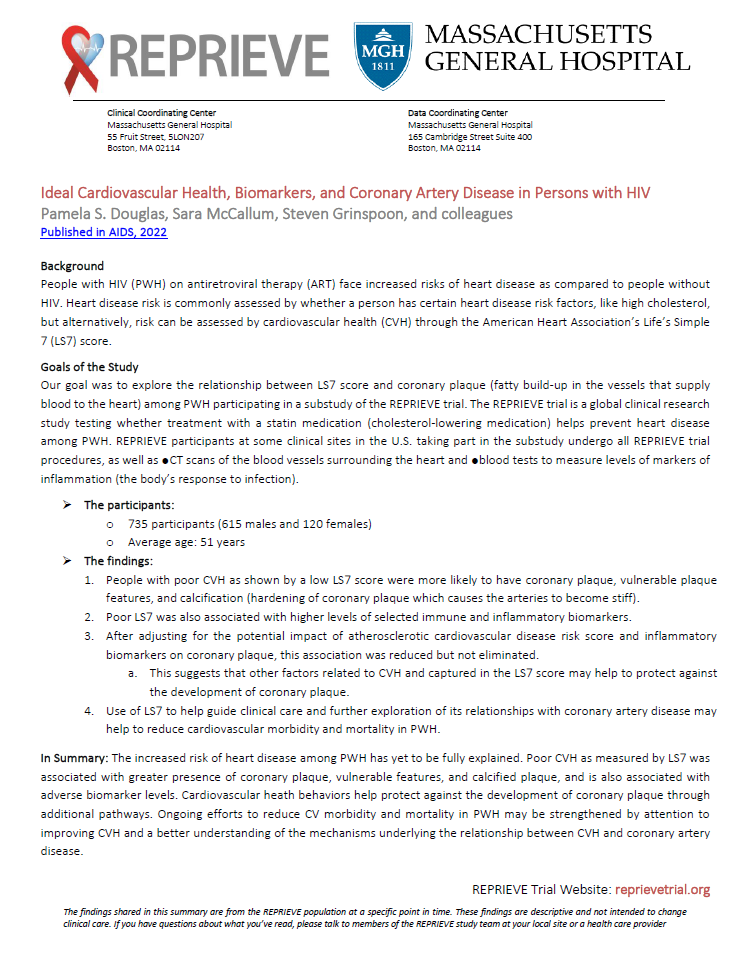
Ideal cardiovascular health, biomarkers, and coronary artery disease in persons with HIV
People with HIV (PWH) on antiretroviral therapy (ART) face increased risks of heart disease as compared to people without HIV. Heart disease risk is commonly assessed by whether a person has certain heart disease risk factors, like high cholesterol, but alternatively, risk can be assessed by cardiovascular health (CVH) through the American Heart Association’s Life’s Simple 7 (LS7) score.
English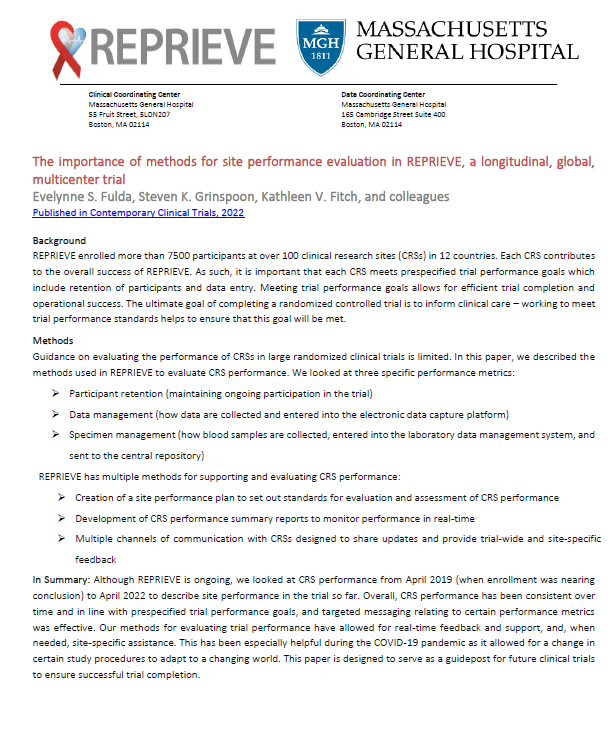
The importance of methods for site performance evaluation in REPRIEVE, a longitudinal, global, multicenter trial
REPRIEVE enrolled more than 7500 participants at over 100 clinical research sites (CRSs) in 12 countries. Each CRS contributes to the overall success of REPRIEVE. As such, it is important that each CRS meets prespecified trial performance goals which include retention of participants and data entry. Meeting trial performance goals allows for efficient trial completion and operational success. The ultimate goal of completing a randomized controlled trial is to inform clinical care – working to meet trial performance standards helps to ensure that this goal will be met.
English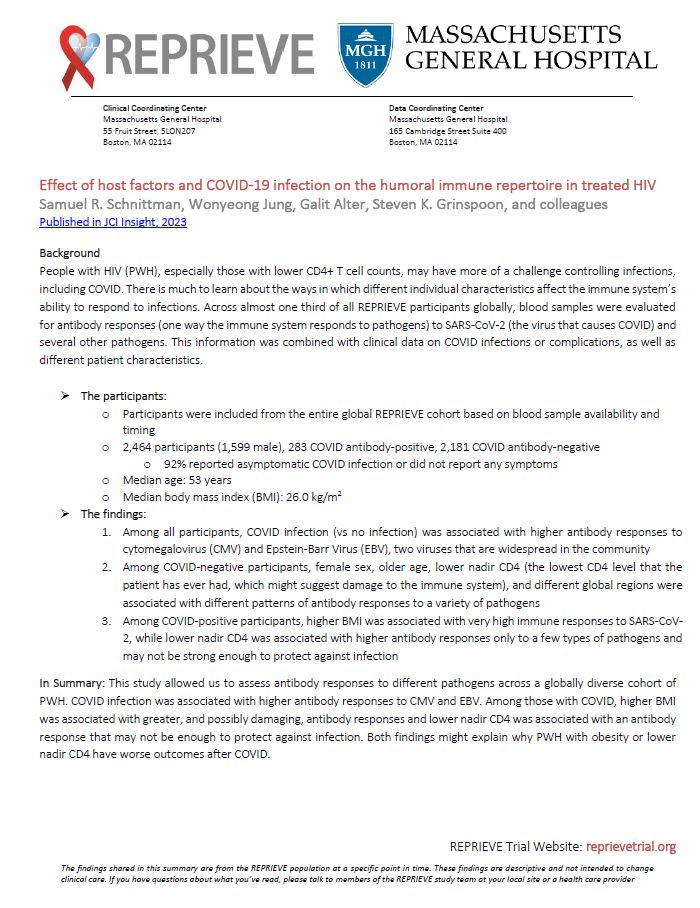
Effect of host factors and COVID-19 infection on the humoral immune repertoire in treated HIV
People with HIV (PWH), especially those with lower CD4+ T cell counts, may have more of a challenge controlling infections, including COVID. There is much to learn about the ways in which different individual characteristics affect the immune system’s ability to respond to infections. Across almost one third of all REPRIEVE participants globally, blood samples were evaluated for antibody responses (one way the immune system responds to pathogens) to SARS-CoV-2 (the virus that causes COVID) and several other pathogens. This information was combined with clinical data on COVID infections or complications, as well as different patient characteristics.
English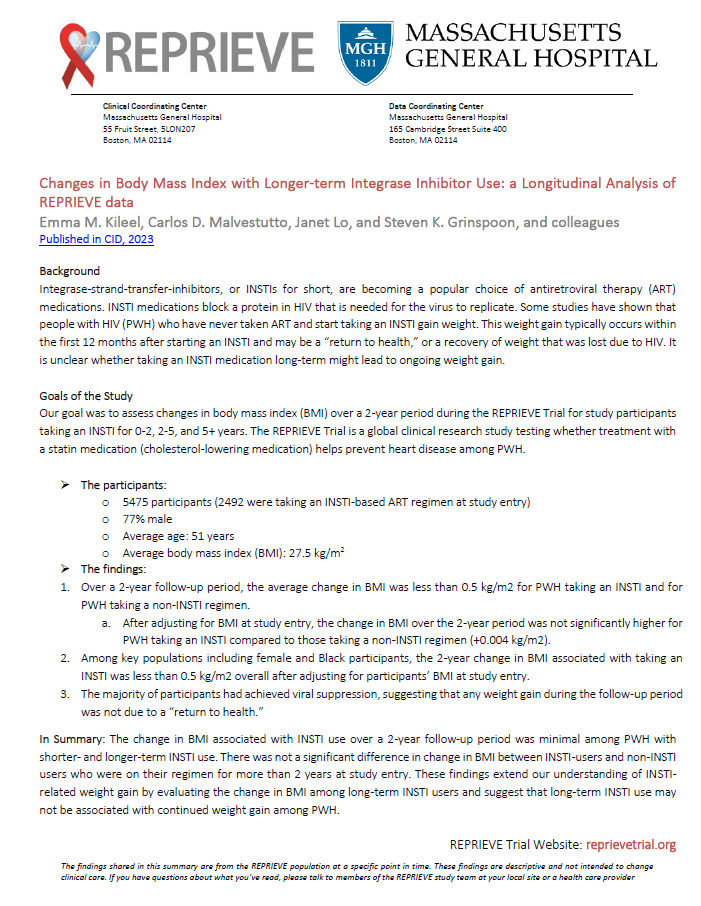
Changes in Body Mass Index with Longer-term Integrase Inhibitor Use: a Longitudinal Analysis of REPRIEVE data
Integrase-strand-transfer-inhibitors, or INSTIs for short, are becoming a popular choice of antiretroviral therapy (ART) medications. INSTI medications block a protein in HIV that is needed for the virus to replicate. Some studies have shown that people with HIV (PWH) who have never taken ART and start taking an INSTI gain weight. This weight gain typically occurs within the first 12 months after starting an INSTI and may be a “return to health,” or a recovery of weight that was lost due to HIV. It is unclear whether taking an INSTI medication long-term might lead to ongoing weight gain.
English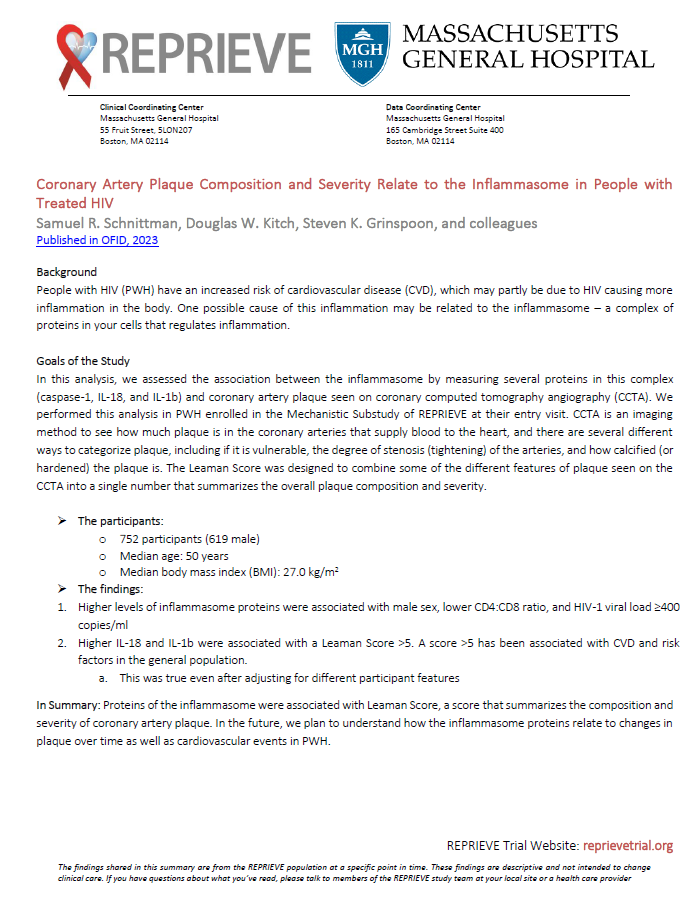
Coronary Artery Plaque Composition and Severity Relate to the Inflammasome in People with Treated HIV
People with HIV (PWH) have an increased risk of cardiovascular disease (CVD), which may partly be due to HIV causing more inflammation in the body. One possible cause of this inflammation may be related to the inflammasome – a complex of proteins in your cells that regulates inflammation.
English
Identification of pre-infection markers and differential plasma protein expression following SARS-CoV-2 infection in people living with HIV
People with HIV (PWH) are at equal risk of getting COVID but have an increased risk of having a more severe case of COVID. The reasons for this are not well understood. Symptoms of long-COVID have also increased the burden of other diseases, like underlying cardiovascular disease.
English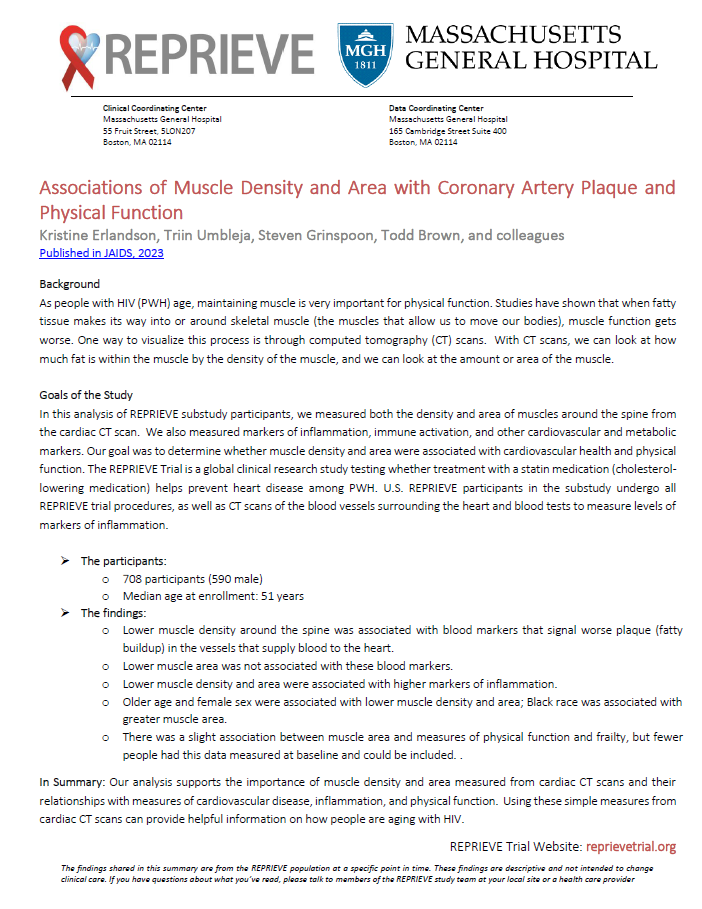
Associations of Muscle Density and Area with Coronary Artery Plaque and Physical Function
As people with HIV (PWH) age, maintaining muscle is very important for physical function. Studies have shown that when fatty tissue makes its way into or around skeletal muscle (the muscles that allow us to move our bodies), muscle function gets worse. One way to visualize this process is through computed tomography (CT) scans. With CT scans, we can look at how much fat is within the muscle by the density of the muscle, and we can look at the amount or area of the muscle.
English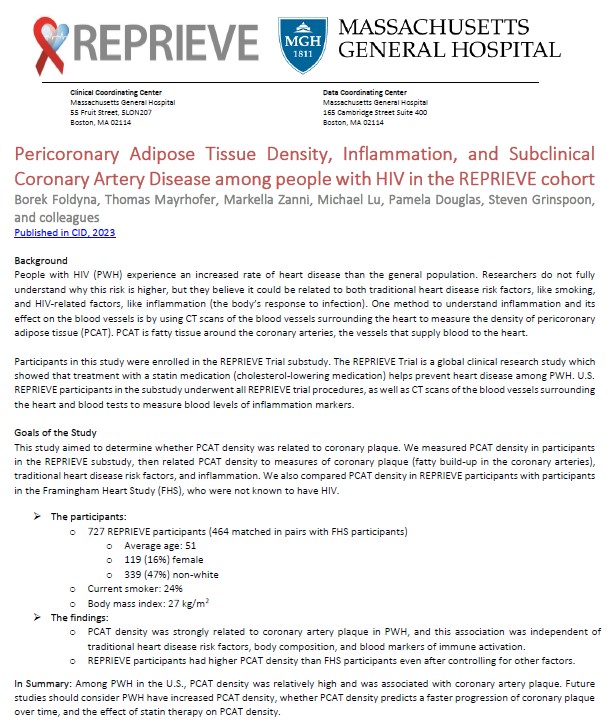
Pericoronary Adipose Tissue Density, Inflammation, and Subclinical Coronary Artery Disease among people with HIV in the REPRIEVE cohort
People with HIV (PWH) experience an increased rate of heart disease than the general population. Researchers do not fully understand why this risk is higher, but they believe it could be related to both traditional heart disease risk factors, like smoking, and HIV-related factors, like inflammation (the body’s response to infection). One method to understand inflammation and its effect on the blood vessels is by using CT scans of the blood vessels surrounding the heart to measure the density of pericoronary adipose tissue (PCAT). PCAT is fatty tissue around the coronary arteries, the vessels that supply blood to the heart.
English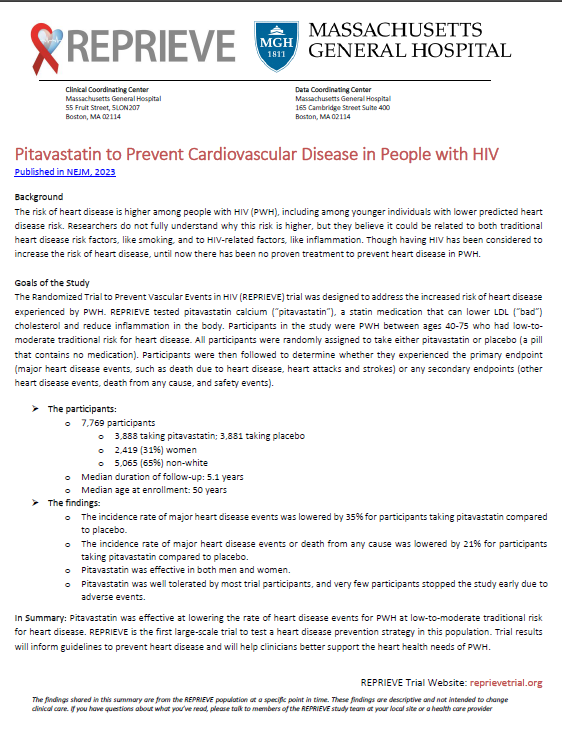
Pitavastatin to Prevent Cardiovascular Disease in People with HIV
The risk of heart disease is higher among people with HIV (PWH), including among younger individuals with lower predicted heart disease risk. Researchers do not fully understand why this risk is higher, but they believe it could be related to both traditional heart disease risk factors, like smoking, and to HIV-related factors, like inflammation. Though having HIV has been considered to increase the risk of heart disease, until now there has been no proven treatment to prevent heart disease in PWH.
English Spanish Portuguese Thai Afrikaans French French Canadian Haitian Creole Sesotho Xhosa Zulu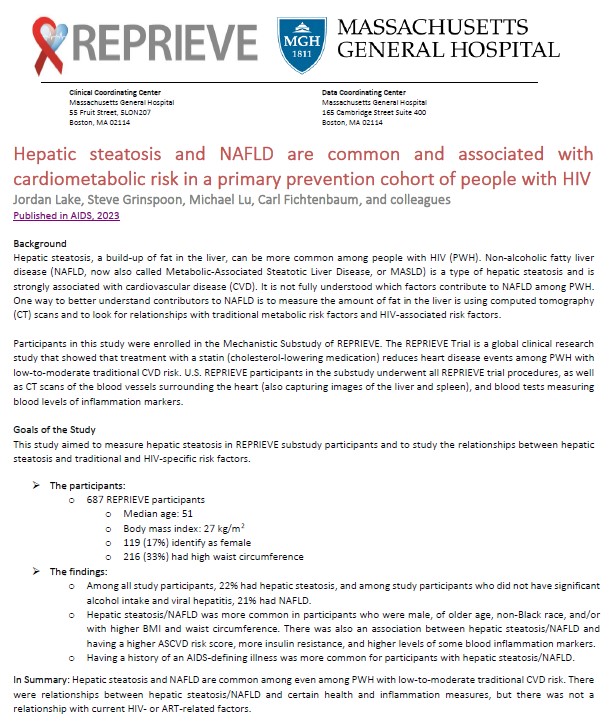
Hepatic steatosis and NAFLD are common and associated with cardiometabolic risk in a primary prevention cohort of people with HIV
Hepatic steatosis, a build-up of fat in the liver, can be more common among people with HIV (PWH). Non-alcoholic fatty liver disease (NAFLD, now also called Metabolic-Associated Steatotic Liver Disease, or MASLD) is a type of hepatic steatosis and is strongly associated with cardiovascular disease (CVD). It is not fully understood which factors contribute to NAFLD among PWH. One way to better understand contributors to NAFLD is to measure the amount of fat in the liver is using computed tomography (CT) scans and to look for relationships with traditional metabolic risk factors and HIV-associated risk factors.
English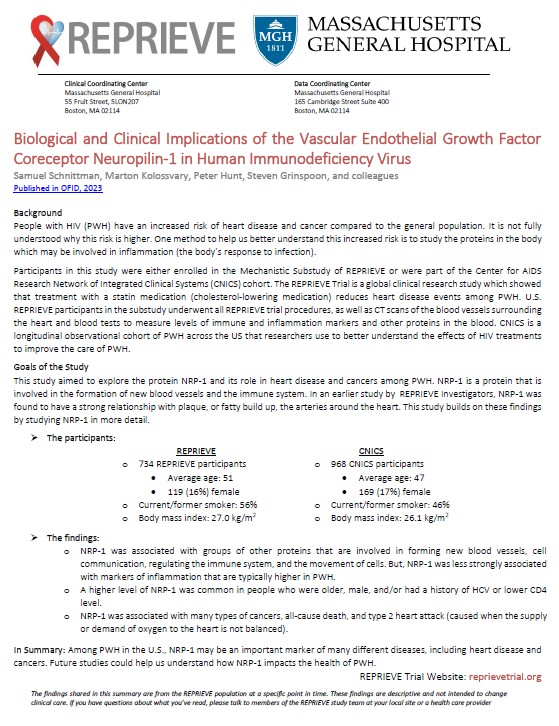
Biological and Clinical Implications of the Vascular Endothelial Growth Factor Coreceptor Neuropilin-1 in Human Immunodeficiency Virus
People with HIV (PWH) have an increased risk of heart disease and cancer compared to the general population. It is not fully understood why this risk is higher. One method to help us better understand this increased risk is to study the proteins in the body which may be involved in inflammation (the body’s response to infection).
English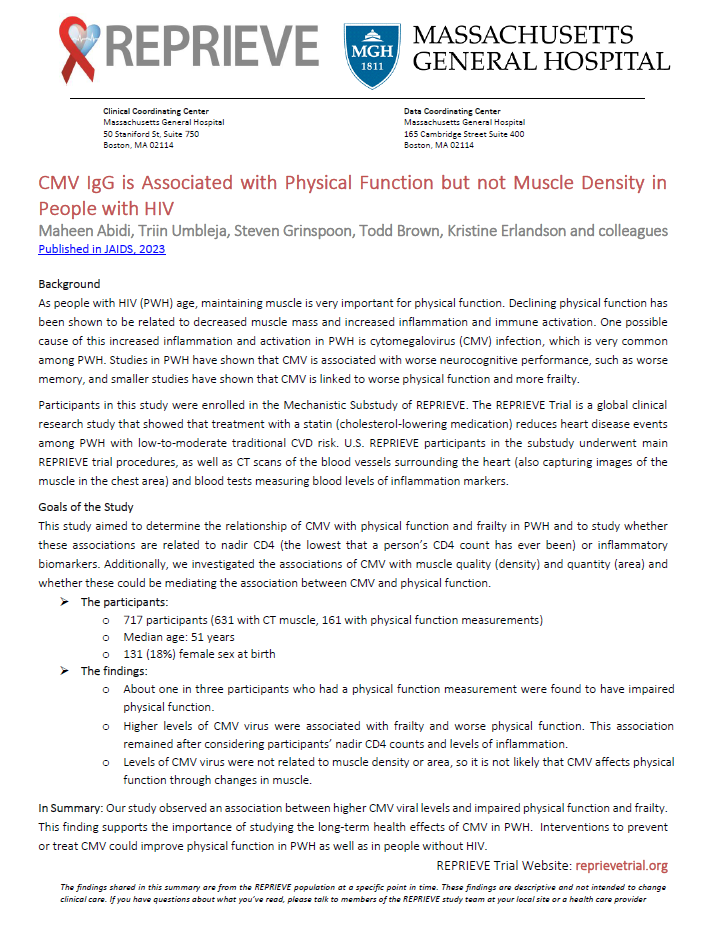
CMV IgG is Associated with Physical Function but not Muscle Density in People with HIV
As people with HIV (PWH) age, maintaining muscle is very important for physical function. Declining physical function has been shown to be related to decreased muscle mass and increased inflammation and immune activation. One possible cause of this increased inflammation and activation in PWH is cytomegalovirus (CMV) infection, which is very common among PWH. Studies have shown that CMV is associated with worse neurocognitive performance, such as worse memory, and smaller studies have shown that CMV is linked to worse physical function and more frailty.
English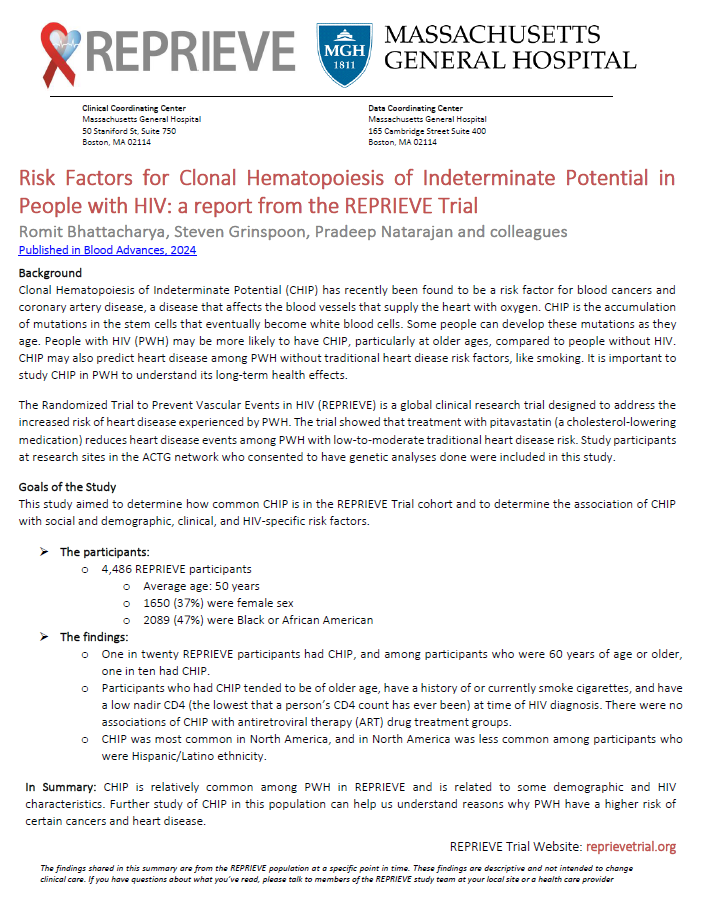
Risk Factors for Clonal Hematopoiesis of Indeterminate Potential in People with HIV: a report from the REPRIEVE Trial
Clonal Hematopoiesis of Indeterminate Potential (CHIP) has recently been found to be a risk factor for blood cancers and coronary artery disease, a disease that affects the blood vessels that supply the heart with oxygen. CHIP is the accumulation of mutations in the stem cells that eventually become white blood cells. Some people can develop these mutations as they age. People with HIV (PWH) may be more likely to have CHIP, particularly at older ages, compared to people without HIV. CHIP may also predict heart disease among PWH without traditional heart disease risk factors, like smoking. It is important to study CHIP in PWH to understand its long-term health effects.
English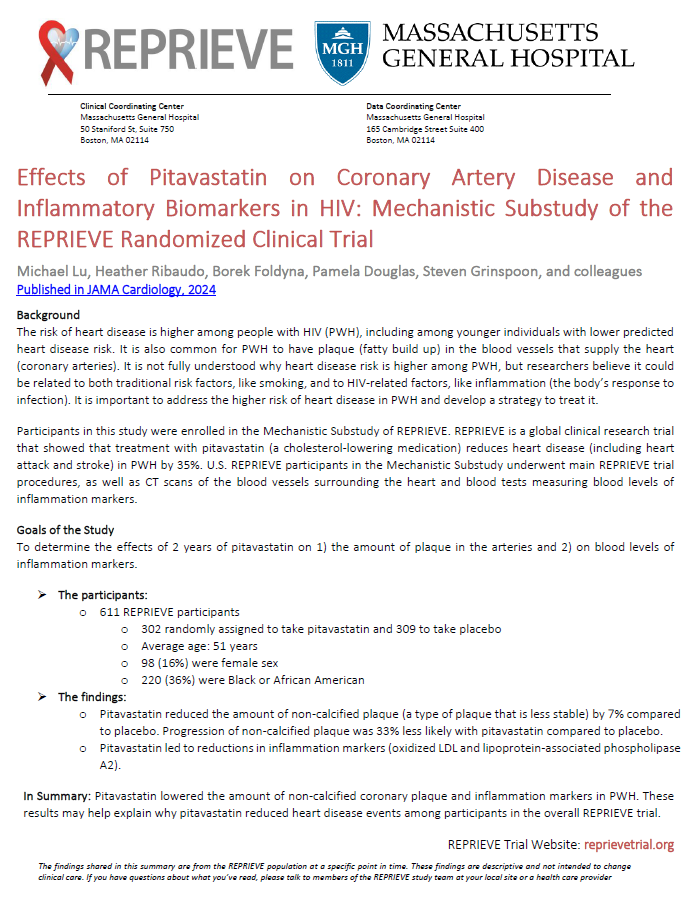
Effects of Pitavastatin on Coronary Artery Disease and Inflammatory Biomarkers in HIV: Mechanistic Substudy of the REPRIEVE Randomized Clinical Trial
The risk of heart disease is higher among people with HIV (PWH), including among younger individuals with lower predicted heart disease risk. It is also common for PWH to have plaque (fatty build up) in the blood vessels that supply the heart (coronary arteries). It is not fully understood why heart disease risk is higher among PWH, but researchers believe it could be related to both traditional risk factors, like smoking, and to HIV-related factors, like inflammation (the body’s response to infection). It is important to address the higher risk of heart disease in PWH and develop a strategy to treat it.
English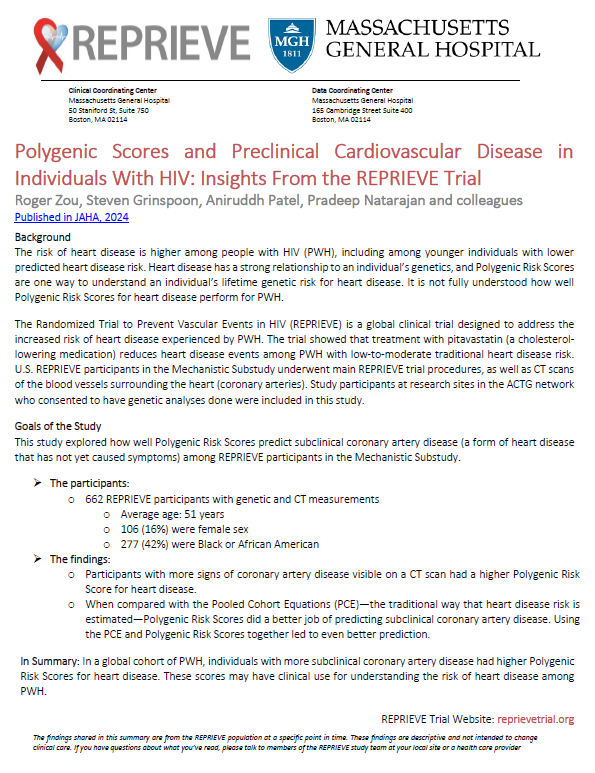
Polygenic Scores and Preclinical Cardiovascular Disease in Individuals With HIV: Insights From the REPRIEVE Trial
The risk of heart disease is higher among people with HIV (PWH), including among younger individuals with lower predicted heart disease risk. Heart disease has a strong relationship to an individual’s genetics, and Polygenic Risk Scores are one way to understand an individual’s lifetime genetic risk for heart disease. It is not fully understood how well Polygenic Risk Scores for heart disease perform for PWH.

Coronary plaque in asymptomatic people with HIV vs non-HIV asymptomatic community and symptomatic higher-risk populations
The risk of heart disease is higher among people with HIV (PWH), including among younger individuals with lower predicted heart disease risk. It is common for PWH to have plaque (fatty and/or calcified build up) in the walls of the blood vessels that supply the heart (coronary arteries). However, it is not fully understood how heart disease and plaque among PWH compares to populations without known HIV.
English